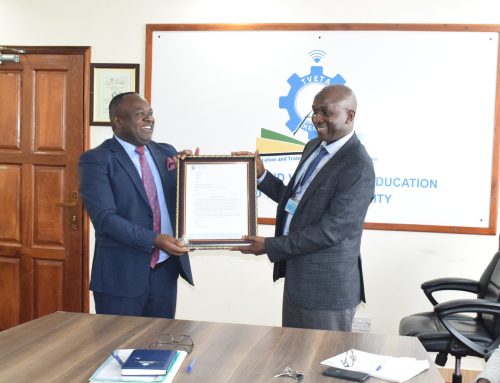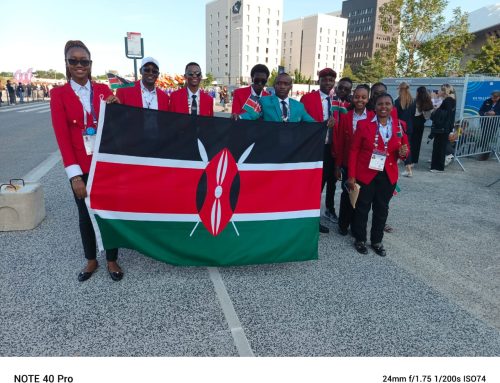TVET Authority Director General/CEO Dr. Kipkirui Langat the CEO Kenya Health Professions Oversight Authority (KHPOA) Dr. Kioko Jackson today held a consultative meeting to discuss how the two State corporations can work together to streamline the regulation and accreditation of professionals and institutions in the health related fields.
The meeting, which was held at the TVETA offices, was also attended by Dr. Kemunto Misega and Sophie Waihenya from KHPOA and TVETA’s Dr Otta Osawa and Timothy Nyongesa. Others in the meeting were Denis Oketch and Jamlick Gitonga from Peri-operative Technicians and Technologists Association of Kenya (POTTA).
The two CEOs formed a team that was mandated to bring together all the stakeholders to develop a framework on how various regulatory bodies can work jointly, especially during the inspection and accreditation of institutions and professionals in the various health fields.
Kenya Health Professions Oversight Authority is a body corporate mandated to provide oversight in regulation of healthcare service delivery: training, registration and licensing of health professions and ensuring compliance of health professionals standards and practice.
While TVETA is a state corporation established under the TVET Act, 2013 and mandated to coordinate and regulate training in the TVET sector through the licensing, registration, and accreditation of programes, institutions and trainers.
TVETA Director General said that the two regulators will come up with a framework for joint inspection of institutions in the health sector as a benchmark for the rest in the TVET training sector.
“We will also have discussions on how we can reduce the licence fees charged by regulators because these charges are passed to students, hence a burden to parents. Having joint inspection teams from all the regulators will bring down some of these fees,” Dr. Langat observed.
KHPOA Dr. Kioko Jackson said that his Authority is concerned that while there are 42 professional cadres in the health sector, only nine fields are regulated and hence practitioners are accredited and awarded with practicing certificates. The other 33 are unregulated.
“We need to look at the accreditation and certification process of these other fields so that they can also be regulated and professionals are given practicing certificates,” Dr Kioko said.
“We also need to bring together all the regulators in the sector so that we can have joint health teams during the inspection and accreditation process,” he added.
Dr. Kioko said the Authority is currently conducting a mapping exercise aimed at creating a database of all healthcare professionals currently not regulated and have them in the regulated.
The Patron of Peri-operative Technicians and Technologists Association of Kenya Mr. Oketch and Registrar Mr. Gitonga supported the efforts by the two regulators to bring sanity in the health training field, noting that the professionals they represent are amongst the cadre that is recognized by the government but do not have a regulator and are not issued with practicing licences.
“This make it difficult for peri-operative technicians and technologists to be employed by the government. They only work in the private sector,” Gitonga noted.



